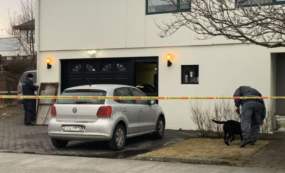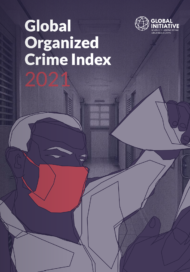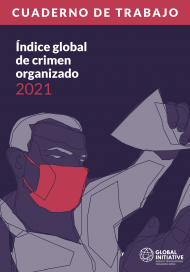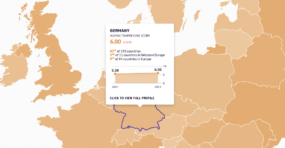Clan criminality is perceived as a worrying trend in Germany. Law enforcement needs to engage new strategies to successfully combat these structures, an ‘external’ criminal threat within the country and beyond.
Clan criminality in Germany has received increased media attention in the past years. Although criminal offences committed by clans were thought to constitute a very small proportion of all offences in the country in 2020, the visibility and impact of clan criminality – including the 2019 high-profile heist of historic jewels worth an estimated €113.8 million – has made this phenomenon a priority.
According to the Global Initiative Against Transnational Organized Crime’s Global Organized Crime Index 2021, Germany has a criminal actor score of 5.00 in the ‘mafia-style groups’ indicator, one of the highest for countries in Western Europe and above the global average of 3.89. Its criminal foreign actors score of 6.50 is also higher than the global average (5.27).
In Germany, mafia-style groups (i.e. organized criminals with a known name, a defined leadership, territorial control and identifiable membership) include both foreign and domestic groups, such as the Italian mafia, Russian-Eurasian organized crime groups, biker gangs and the so-called clan organizations.
Clan criminality is perpetrated by family-based networks, who commit a variety of crimes such as armed robberies, theft, bombing of ATM machines, money laundering and drug trafficking. ‘We are dealing here with … serious criminals … with robbery, fraud and organized crime … This shows that some of the clans are playing in the same league as the mafia,’ said Herbert Reul, Interior Minister of the North Rhine-Westphalia state.
Clan groups are known for their tight-knit structures based on familial ties, but most of all for their aggressive behaviour towards the police and other state agencies. State responses to the problem have focused on areas such as cooperation between state forces, confiscation of illegal wealth, investigation of minor offences and, perhaps most importantly, the development of strategies designed to deter young clan members from pursuing criminal careers.
In February 2021, some 500 police officers from Berlin and Brandenburg searched over 20 homes after information on illegal weapon deals had been uncovered. In another case, a clan member is accused of money laundering and organizing a cocaine courier service to Berlin.
German clan criminality is not a uniquely domestic phenomenon. Although most clan-related criminal activities are committed in Germany, according to the Federal Criminal Police Office’s 2020 criminality report, there were 29 organized crime proceedings in which members of German clans were active in other countries. Often, the informal hawala payment system is used to transfer money across borders.
Classification of criminal actors
There is no clear or agreed-upon definition for clan criminality. In Germany, perpetrator groups are understood as ethnic subcultures, usually comprising large families. These family-associated structures also include the Italian mafia, groups of Western Balkan or Russian-Eurasian origin, and clan families of Arab or Turkish origin. Although this is the terminology used in Germany, it is important to note that it refers mainly to the groups’ migration background, not their citizenship. Second- and third-generation members of these family clans have been born in Germany and have German citizenship.
German law enforcement agencies compiled a number of indicators and criteria to help define clan criminality in connection to organized crime, including kinship ties, a strong focus on a patriarchal-hierarchical family structure, ideological legitimation of criminal activity, rejection of the German legal system and use of violence.
These criteria show a clear difference in modus operandi when compared with other organized crime groups without deep family linkages. However, clan criminality is far more visible due to its open aggression towards and disregard of state authority compared to the more subtle agency of the Italian mafia, for example. Its kinship structures are also more closed, keeping membership restricted to blood relations. This complicates the use of certain counter-crime strategies used against other mafia-style groups. For instance, undercover operations are impossible unless a family member of the group is deployed for this purpose.
The specific characteristics of clan criminality become clear when tracing its origin and growth over the years. During migration flows of the 1970s to the 1990s, many Arabic-speaking Kurdish groups fleeing the Lebanese civil war found refuge in Germany. Already secluded minorities in Lebanon, these refugees stayed in large, tight-knit family structures, isolated from the larger German society. Other (non-Kurdish) groups, including families from Palestine, such as the Abou-Chaker-Clan active in Berlin, share a similar history and often similar internal structures.
Responses
Arguably, this formation of an ethnic ‘parallel society’ presents one of the major challenges to police and law enforcement. As some clan families in Germany have up to 2 500 members, it is important to recognize that not all family clans, nor all members of specific clans, are involved in criminality. However, clan members do tend to look after one another’s interests, and the efficacy of tried investigation methods such as witness testimony, undercover agents and telephone surveillance, among others, is limited, as members will not turn against each other.
State responses have been criticized for not having done enough to address the threat. This may be due to the ethnicity factor, which makes targeting clan criminality a politically delicate issue. Groups’ integration into Germany society presents a major challenge and attempts to incorporate arbiters to mediate inter-clan disagreements – which often lead to violence – have been criticized as enabling a form of ‘parallel justice’, hindering true integration.
A systematic approach is needed, starting at the roots of the issue. Experts have emphasized that the state must demonstrate its presence and authority early, not only to signal to society that all areas of a city are safe (and also counter media hysteria), but also to respond to the lack of respect of state law enforcement exhibited by clan members. Any forms of ‘parallel justice’, as promising as they may seem in the short term, ought to be limited. If the clan crime phenomenon is rooted in the failure of certain groups to integrate into German society (or the state’s failure to help integrate them), then solutions must incorporate strategies that address this failing. A clear stance on what clan criminality actually entails, and an operational definition, would also offer a stronger basis for actionable interventions.
This analysis is part of the GI-TOC’s series of articles delving into the results of the Global Organized Crime Index 2021. The series explores the Index’s findings and their effects on policymaking, anti-organized crime measures and analyses from a thematic or regional perspective.
Clankriminalität – Deutschlands ignoriertes Risiko des transnationalen organisierten Verbrechens?
Clankriminalität wird in Deutschland als besorgniserregender Trend wahrgenommen. Die Strafverfolgungsbehörden müssen neue Strategien entwickeln, um diese Strukturen, die eine “externe” kriminelle Bedrohung innerhalb des Landes und darüber hinaus darstellen, erfolgreich zu bekämpfen.
Clankriminalität in Deutschland hat in den letzten Jahren erhöhte Aufmerksamkeit in den Medien erfahren. Obwohl davon ausgegangen wurde, dass die von Clans begangenen Verbrechen im Jahr 2020 nur einen sehr geringen Anteil aller Straftaten in Deutschland ausmachen, haben Sichtbarkeit und Einfluss der Clankriminalität – einschließlich des aufsehenerregenden Raubes historischer Juwelen im Wert von geschätzten 113,8 Millionen Euro im Jahr 2019 – dieses Phänomen zu einer Priorität gemacht.
Laut dem Global Organized Crime Index 2021 der Global Initiative Against Transnational Organized Crime (Globalen Initiative gegen transnationale organisierte Kriminalität, GI-TOC) liegt Deutschland beim Indikator “mafiöse Gruppen” bei einem Wert von 5,00 für kriminelle Akteure. Dieser gehört zu den höchsten in Westeuropa und liegt über dem weltweiten Durchschnitt von 3,89. Der Wert für kriminelle ausländische Akteure ist mit 6,50 ebenfalls höher als der weltweite Durchschnitt (5,27).
Zu den mafiösen Gruppen (d.h. organisierte Kriminelle mit bekanntem Namen, einer definierten Führung, territorialer Kontrolle und identifizierbarer Mitgliedschaft) gehören in Deutschland sowohl ausländische als auch inländische Gruppen, darunter die italienische Mafia, russisch-eurasische organisierte Verbrechergruppen, Biker-Gangs und die so genannten Clan-Organisationen.
Clankriminalität wird von familienbasierten Netzwerken begangen, die in eine Vielzahl von Verbrechen involviert sind, darunter bewaffnete Raubüberfälle, Diebstahl, Bombenanschläge auf Geldautomaten, Geldwäsche und Drogenhandel. „Wir haben es hier mit … Schwerverbrechern zu tun … mit Raub, Betrug und Organisierter Kriminalität … Das zeigt, dass einige der Clans in der gleichen Liga spielen wie die Mafia“, sagte Herbert Reul, Innenminister des Landes Nordrhein-Westfalen.
Clan-Gruppen sind für ihre eng verwobenen, auf familiären Bindungen basierenden Strukturen, vor allem aber für ihr aggressives Verhalten gegenüber der Polizei und anderen Behörden bekannt. Die staatlichen Maßnahmen zur Bekämpfung des Problems konzentrieren sich auf Bereiche wie die Zusammenarbeit zwischen Behörden, die Konfiskation von illegalem Vermögen und die Ermittlung bei geringfügigen Straftaten. Zudem ist Entwicklung von Strategien, die junge Clan-Mitglieder davon abhalten sollen, eine kriminelle Laufbahn einzuschlagen das vielleicht wichtigste Mittel in der Verbrechensprävention.
Die Clans sind in transnationalen Aktivitäten der organisierten Kriminalität wie Drogenhandel, Geldwäsche, Schleusung von Migranten und illegalem Waffenhandel involviert. Im Februar 2021 durchsuchten rund 500 Polizeibeamte aus Berlin und Brandenburg mehr als 20 Wohnungen, nachdem Informationen über illegale Waffengeschäfte bekannt geworden waren. In einem anderen Fall wird ein Clan-Mitglied der Geldwäsche und der Organisation eines Kokain-Kurierdienstes nach Berlin beschuldigt.
Die deutsche Clankriminalität ist nicht bloß ein nationales Phänomen. Obwohl die meisten Straftaten mit Clan-Beteiligung in Deutschland verübt werden, gab es laut dem Kriminalitätsbericht 2020 des Bundeskriminalamtes 29 Verfahren gegen das Organisierte Verbrechen, in denen Mitglieder deutscher Clans im Ausland aktiv waren. Häufig wird das informelle Hawala-Zahlungssystem für den Geldtransfer zwischen Staaten genutzt.
Klassifizierung der kriminellen Akteure
Es gibt keine klare oder einheitliche Definition von Clankriminalität. In Deutschland werden Tätergruppen als ethnische Subkulturen verstanden, die meist aus Großfamilien bestehen. Zu diesen durch familiäre Strukturen verbundenen Gruppen gehören auch die italienische Mafia, Gruppen russisch-eurasischer Herkunft oder dem Westbalkan sowie Clan-Familien arabischer oder türkischer Herkunft. Obwohl dies die in Deutschland verwendete Terminologie ist, muss darauf hingewiesen werden, dass sie sich hauptsächlich auf den Migrationshintergrund der Gruppen bezieht, nicht auf ihre Staatsangehörigkeit. Mitglieder dieser Familienclans zweiter und dritter Generation sind in Deutschland geboren und besitzen die deutsche Staatsbürgerschaft.
Die deutschen Strafverfolgungsbehörden haben eine Reihe von Indikatoren und Kriterien zusammengestellt, die helfen sollen, Clankriminalität im Zusammenhang mit organisierter Kriminalität zu definieren. Dazu gehören verwandtschaftliche Bindungen, eine starke Ausrichtung auf eine patriarchalisch-hierarchische Familienstruktur, die ideologische Legitimation krimineller Aktivitäten, Ablehnung des deutschen Rechtssystems und Gewaltanwendung.
Diese Kriterien zeigen einen deutlichen Unterschied des Modus Operandi im Vergleich zu anderen Verbrechergruppen ohne tiefe familiäre Bindungen. Allerdings ist Clankriminalität durch ihre Missachtung und offene Aggression gegenüber der Staatsgewalt weitaus sichtbarer als beispielsweise die italienische Mafia mit ihrer subtileren Vorgehensweise. Auch sind die Verwandtschaftsstrukturen geschlossener, da die Mitgliedschaft auf Blutsverwandte beschränkt bleibt. Dies erschwert die Anwendung bestimmter Strategien zur Verbrechensbekämpfung, die gegen andere mafiöse Gruppen eingesetzt werden können. So sind beispielsweise verdeckte Ermittlungen nur möglich, wenn ein Familienmitglied zu diesem Zweck eingesetzt werden kann.
Die spezifischen Merkmale der Clankriminalität werden deutlich, wenn man ihren Ursprung und ihr Wachstum über die Jahre untersucht. Während der Migrationsströme der 1970er bis 1990er Jahre fanden viele arabischsprachige kurdische Gruppen auf der Flucht vor dem libanesischen Bürgerkrieg Zuflucht in Deutschland. Diese Geflüchteten, die bereits im Libanon eine abgeschottete Minderheit waren, lebten in großen, eng verbundenen Familienstrukturen, isoliert von der deutschen Gesellschaft. Andere (nicht-kurdische) Gruppen, einschließlich Familien aus Palästina wie der in Berlin aktive Abou-Chaker-Clan, haben eine ähnliche Geschichte und weisen oft ähnliche interne Strukturen auf.
Reaktionen
Diese Bildung einer ethnischen “Parallelgesellschaft” stellt eine der wohl größten Herausforderungen für Polizei und Strafverfolgung dar. Da einige Clan-Familien in Deutschland bis zu 2 500 Mitglieder zählen, ist es wichtig zu verstehen, dass weder alle Familienclans noch alle Mitglieder bestimmter Clans in Kriminalität verwickelt sind. Jedoch neigen Mitglieder dazu, die Interessen des Clans zu wahren, weshalb die Wirksamkeit von bewährten Ermittlungsmethoden mithilfe von Zeugenaussagen, verdeckten Ermittlern und Telefonüberwachung begrenzt ist, da sich Mitglieder gegenseitig decken.
Die staatlichen Maßnahmen wurden dafür kritisiert, dass sie nicht genug gegen die Bedrohung unternommen haben. Dies mag auf den Faktor der ethnischen Zugehörigkeit zurückzuführen sein, der die Bekämpfung der Clankriminalität zu einem politisch heiklen Thema macht. Die Integration der Gruppen in die deutsche Gesellschaft stellt eine große Herausforderung dar. Versuche, Schlichter zur Mediation von Streitigkeiten zwischen den Clans einzusetzen, die oft zu Gewalt führen, wurden als Möglichmachung einer Art “Paralleljustiz” kritisiert, die eine echte Integration behindert.
Ein systematischer Ansatz, der an den Wurzeln des Problems ansetzt, ist notwendig. Experten haben betont, dass der Staat frühzeitig seine Präsenz und Autorität unter Beweis stellen muss. Nicht nur, um der Gesellschaft zu signalisieren, dass alle Stadtteile sicher sind und um der Medienhysterie entgegenzuwirken, sondern auch, um auf den mangelnden Respekt der Clan-Mitglieder gegenüber der staatlichen Strafverfolgung zu reagieren. Jegliche Form der “Paralleljustiz”, so vielversprechend sie auf kurze Sicht auch erscheinen mag, sollte begrenzt werden. Wenn das Phänomen der Clankriminalität auf das Versagen bestimmter Gruppen zurückzuführen ist, sich in die deutsche Gesellschaft zu integrieren (oder auf das Versagen des Staates, sie bei der Integration zu unterstützen), dann müssen die Lösungen auch Strategien enthalten, die dieses Versagen adressieren. Eine klare Haltung dazu, was genau Clankriminalität ausmacht, und eine operationelle Definition würden zudem eine bessere Grundlage für handlungsfähige Interventionen bieten.
Diese Analyse ist Teil der Artikelserie des GI-TOC über die Ergebnisse des Global Organized Crime Index 2021 (Index für Organisierte Kriminalität). Die Reihe befasst sich mit den Befunden des Index und ihren Auswirkungen auf die Politikgestaltung, Maßnahmen zur Bekämpfung der Organisierten Kriminalität und Analysen aus thematischer oder regionaler Sicht.



